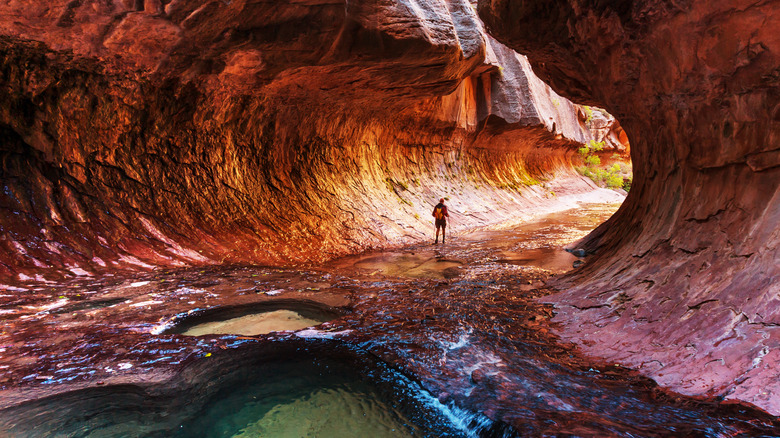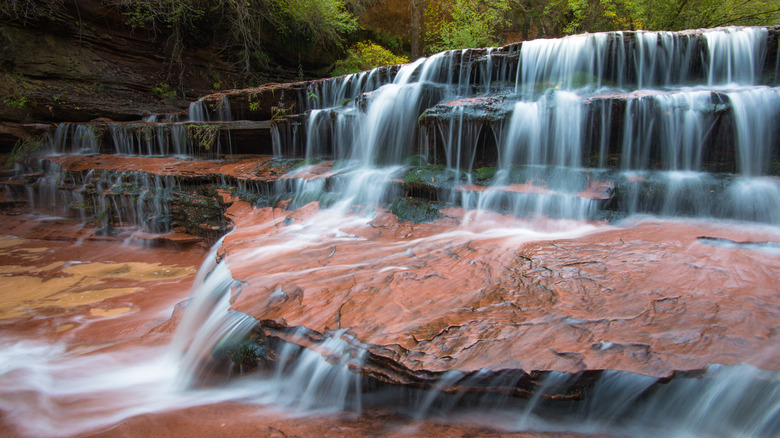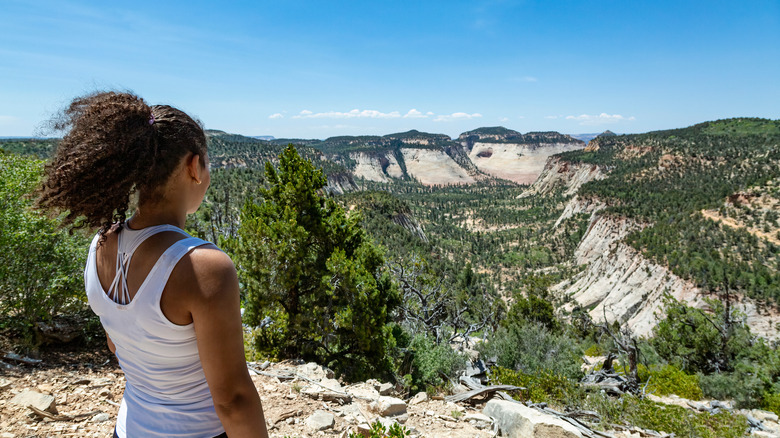This Gorgeous Hike In Zion National Park Is Known As The Most Exclusive For A Reason
Zion National Park in southwestern Utah is a wildly popular place for nature lovers. Covering an expansive area of approximately 232 square miles, the park showcases the insane beauty and grandeur of Red Rock Country and the American Southwest. Its dramatic, brilliantly colorful landscape encompasses high plateaus, towering sandstone cliffs, and deep canyons carved meticulously by the Virgin River over 250 million years. These geological masterpieces within Zion are proof that the greatest artist anyone's ever known is Mother Earth herself, with a little help from wind and erosion. However, the park is more than just a bunch of rocks. Many different types of animals inhabit the park along with more than 1,000 species of plants, from majestic cottonwoods and pines to desert-friendly cholla, yucca, and prickly pears.
Visitors flock to Zion for its serene beauty and outdoor adventure opportunities. Renowned trails like The Narrows and Angel's Landing are known for being some of the coolest hikes, not just in Zion, but in the whole U.S. national park system and maybe even the world. But the disadvantage of these trails being so amazing is that they draw hikers in droves. To ensure pleasant experiences for visitors and protect natural resources in these high-demand areas, the park has instated a permit system for several of its most iconic trails, making them the most exclusive in the park. One of these is the famous Left Fork or Subway trail.
Subway's permit process
The hike on the Subway trail is a challenging 9-mile round trip through a red rock wonderland. The route traverses through creek beds and over giant boulders before arriving at the trail's namesake feature: a section of canyon resembling a subway tunnel, complete with striking emerald pools. But to access all this magic, visitors must first navigate a convoluted permit system, which is almost as daunting as the path itself.
The Left Fork Subway hiking permit system accepts online applications year-round through the official National Park Service website. But this is not just your average reservation process, where you pick a day, pay a fee, and voila, there's your permit. First, you have to go through a seasonal lottery, which you apply to up to four months prior to your desired hiking month, with four or fewer choices for hiking dates. There's also a daily lottery that takes place two days before each hiking date for those who weren't able to score a reservation through the seasonal lottery. For both lotteries, there's a non-refundable $6 application fee, and successful applicants must then pay an additional permit fee of $10 per person once they arrive at either the Zion Canyon or Kolob Canyons Visitor Centers. The competitive nature of the permit system highlights the mind-boggling popularity of this hike, with demand often far exceeding the limited number of permits on a particular day.
Hikes that don't require permits
Those put off by the convoluted reservation process for the Subway hike may want to consider an alternative adventure. Who knows, you might find that a different trail or area becomes your very own personal favorite. The most famous slot canyon hike in Zion, The Narrows, is comparable to Subway in terms of length, scenery, and difficulty. In addition, it doesn't require a permit if you hike it from the bottom up. A few other hikes in Zion that don't require permits and are right up there with Subway and the Narrows in terms of wow factor are the West Rim Trail and the shorter but equally magnificent Canyon Overlook trail. The Kayenta Trail, a moderate hike that leads to waterfalls and the Emerald Pools, is another excellent option.
An area to check out if you want to escape the crowds is the 7,400-acre Snow Canyon State Park, which is just under an hour's drive from Zion. The colorful desert terrain here resembles that of Zion and Bryce National Parks but with fewer crowds and a lot more serenity. If the scenery looks strangely familiar, it's because you may have seen Hollywood films such as "Butch Cassidy and the Sundance Kid," "The Electric Horseman," and "Jeremiah Johnson," parts of which were filmed here.


